Episodes

Friday Nov 10, 2023
ASCA S&C Conference - Common (BFR) Questions and Reflections
Friday Nov 10, 2023
Friday Nov 10, 2023
In this BFR Radio episode, I reflect on the recent Australian Strength and Conditioning Conference (ASCA) where TheBFR.co had an exhibition stand. I had lots of great discussions on BFR training and I can definitely tell the awareness is definitely increasing.
This episode is my reflections on the conference (BFR related of course) and I go through the common questions I got asked. In particular I talk about how to calculate the pressure for BFR training, how BFR works with respect to mechanical stress and metabolic stress, and the benefits of using BFR in practical training scenarios - including improve bone reformation and decreasing joint and tendon pain.
I also talk abut the shift in thinking about BFR, progressing from a rehab focus to considering its potential benefits for athletic performance improvement.
For this episode I am actually recording in my car on the drive to work. I have a few of these episodes lined up as I answer questions I get from time to time. Let me know if you like this format. And if you do have a question, let me know and I'll answer it for you.
Enjoy this episode.
Chris
00:00 Introduction
02:53 Reflections on the ASCA Conference
07:53 Understanding BFR and its Application
17:14 BFR for Athletic Performance Enhancement
22:16 BFR for Pain Reduction and Joint Health
32:08 BFR in Pre and Post Operative Care
34:07 Conclusion and Contact Information
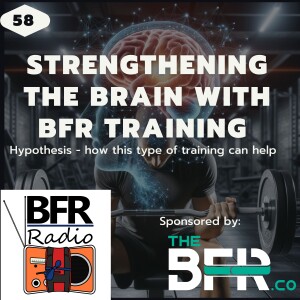
Thursday Nov 02, 2023
Strengthening the Brain with BFR Strength Training
Thursday Nov 02, 2023
Thursday Nov 02, 2023
Enhancing Cognitive Function with Blood Flow Restriction Training: Unveiling the Neurological Benefits
Welcome to the second episode in this series where we look at the positive effects of BFR training and its remarkable impact on cognitive functions. In this installment, we continue our exploration of the intricate relationship between BFR resistance exercise and its potential to significantly enhance brain health and performance.
To do this, we will review the paper:
Strengthening the brain—is resistance training with blood flow restriction an effective strategy for cognitive improvement?.
Törpel, A., Herold, F., Hamacher, D., Müller, N. G., & Schega, L. (2018). Journal of clinical medicine, 7(10), 337.
This is a hypothesis paper looking at how the known key growth factors and hormones associated with BFR can positively influence cognitive performance, and overall brain well-being. I’ll guide you the whole way through this article explaining everything to help you understand.
We will also provide practical insights and recommendations on designing an effective BFR resistance training program, discussing variables like cuff width, pressure calculations, and optimal exercise selections to ensure safety, comfort, and maximum efficacy.
Whether you are a fitness enthusiast, a health professional, or simply curious about innovative ways to enhance cognitive function, this episode is packed with valuable information, backed by scientific research, to guide you through the fascinating world of BFR training.
So, buckle up as we embark on this exciting journey, bridging the gap between physical exercise and cognitive enhancement, and discover how you can leverage the power of BFR training to boost brain health and function.
Don't forget to check back for our answer to the "What Would You Do?" segment.
Enjoy the episode, and remember to keep the pump!
Chris
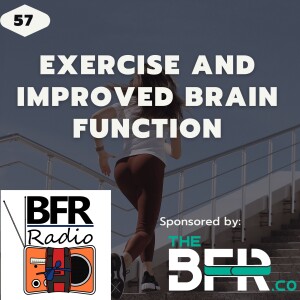
Wednesday Sep 20, 2023
Exercise and Improved Brain Function
Wednesday Sep 20, 2023
Wednesday Sep 20, 2023
Hi and welcome to this episode of BFR Radio.
To kickstart this and the next few episodes, we are going to venture beyond the well-trodden paths of muscle strength and hypertrophy to explore the lesser-known benefits of Blood Flow Restriction (BFR) on cognitive function. In the upcoming episodes, we look at the research that unveils the promising role of BFR in enhancing cognitive abilities, a topic of immense significance, especially for the aging population grappling with cognitive issues.
In our kickstart episode, we dissect the seminal paper "Exercise and Cognitive Function" by Paul Loprinzi, published in the Journal of Clinical Medicine. This review lays the foundational knowledge for our series and looks at how exercise meets cognition.
To understand the mechanisms as to how BFR training can help with cognitive function, there are a few key markers that illustrate how this works. Some of these markers include proteins like BDNF that play a pivotal role in fostering neuron growth and enhancing cognitive abilities and SNPs and their influence on cognitive function.
Although this primarily covers foundational knowledge, the last study we cover is a BFR training study and highlights at the enhanced effectiveness of resistance training with BFR on cognitive performance.
Another concept, I’m keen to explore is a segment called, “What would you do.” For select episodes I’ll pose a scenario-based question. Let me know what you think of this one.
Scenario: You're a college student who has a big exam coming up. You've been studying for weeks, but you're feeling a bit nervous about how well you'll do on the exam. You've heard that exercise can help improve cognitive function, but you're not sure what type of exercise or how long you should exercise for.
What would you do?
As promised, here is the answer: First of all, it's important to remember that exercise can have a positive impact on cognitive function. Studies have shown that even a short bout of exercise, like a 20-minute brisk walk, can improve executive function. So, if you're feeling nervous about your exam, taking a break to go for a walk or do some other type of exercise could be a good idea. In terms of what type of exercise to do, it's important to choose something that you enjoy and that gets your heart rate up. Running, cycling, or playing a sport are all good options. And if you're short on time, even a quick 10-minute workout can be beneficial. So, to answer the question, if you're feeling nervous about an upcoming exam, taking a break to do some exercise could be a good idea. Choose an activity that you enjoy and that gets your heart rate up, and even a short bout of exercise can help improve your cognitive function.
Hope you enjoy this episode.
Chris
Article Resource: McMorris, T., Tomporowski, P., & Audiffren, M. (Eds.). (2009). Exercise and cognitive function. John Wiley & Sons.
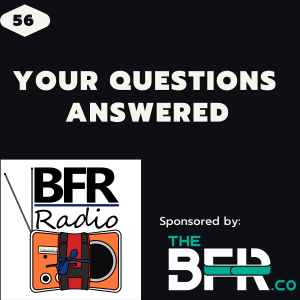
Wednesday May 24, 2023
Your Questions Answered
Wednesday May 24, 2023
Wednesday May 24, 2023
Welcome to episode 56.
I hope you enjoyed our last episode with Sean Jorgenson where he outlines how he uses BFR. It was full of practical ways to incorporate BFR into your own routine - no matter how busy you are.
This week, I have put together some of the questions that you have asked me. I find these have good application to everyone and I am sure you'll get lots of great handy hints with this one.
In this episode we are covering the following questions:
First question, "So, I had an ACL reco last week and am wanting to use my BFR cuffs to help with rehab. When would you say it is a few to start using it post-op?"
The next question, follows on the same theme from the previous.
"How would you structure BFR in a week? For example ACL early post operation, how much would you do in a week?"
This question is also very similar to another general BFR question, around how often can I use BFR in a week. Within this answer I expand and discuss how this concept can be used for BFR use in general and also I talk about a great warm-up protocol that you can incorporate to enhance your BFR sessions.
The last point, is not a question but rather is an easy-to-understand explanation of the mechanisms to how BFR can initiate the healing process with soft-tissue muscle injuries. I have seen some unbelievably quick healing times when incorporating BFR with muscle injuries and strains. With this, I try my best to explain how it works.
As always, if you have questions please ask. Only too happy to answer them.
Thanks for listening and remember to keep the pump.
Chris
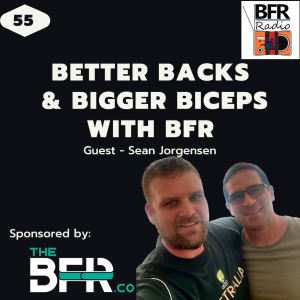
Tuesday Apr 11, 2023
Better Back & Bigger Biceps with Sean Jorgensen
Tuesday Apr 11, 2023
Tuesday Apr 11, 2023
Welcome to this jam packed episode of BFR Radio.
This was a fun episode to record. In this episode I interview Sean Jorgensen who is a good friend of mine. He is a loving father, and loves to keep fit and active. The addition of BFR into his exercise routine has been a bit of a revolution for multiple reasons.
As the title of the episode suggests, the main two benefits is that the addition of BFR has helped his back pain and also he has got bigger biceps. There are so many practical takeaways from this podcast episode that I just can't list it here.
Sean gives fantastic practical advice and highlights some cool ways to incorporate exercise (and BFR) into your own busy lifestyle.
Also, we recorded this episode at his place with the hope of enjoying some smoked meats. Next time.
Enjoy the episode and remember to keep the pump.
Chris
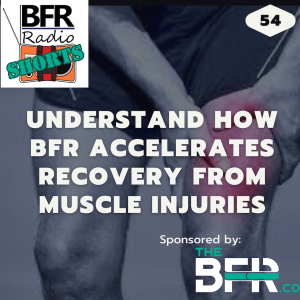
Tuesday Mar 28, 2023
Accelerate recovery from muscle injuries BFR - Understand how it works.
Tuesday Mar 28, 2023
Tuesday Mar 28, 2023
It's competition time for a lot of athletes. Unfortunately, athletes get muscle tears and injuries. I've had a lot success using BFR to accelerate return from injuries in much quicker than normal expected timelines.
The mechanisms and concepts involved in this process is quite complex. So in this BFR Radio "shorts" I've broken it down and tried to explain it in a more relatable way, so you too can understand what is going on.
I've spoken a lot about this concept and had unbelievable success with getting athletes (and non-athletes) back on the track in record time.
This podcast is from the paper,
The role of inflammation and immune cells in blood flow restriction training adaptation: a review. (2018). Rossi, F. E., De Freitas, M. C., Zanchi, N. E., Lira, F. S., & Cholewa, J. M. Frontiers in physiology, 9, 1376.
If you enjoy this short version of the podcast let me know and I'll add them.
Stay tuned for our next podcast which will be an interview where we look at how BFR has been helping bad backs and building bigger biceps.
Chris
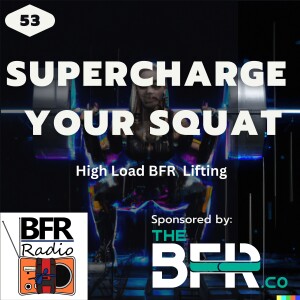
Wednesday Feb 01, 2023
Supercharge your Squat - BFR High Load Lifting
Wednesday Feb 01, 2023
Wednesday Feb 01, 2023
Welcome to the first episode for 2023,
Today's episode continues the theme of adding BFR to high-load lifting. With most of BFR strength training focuses on low-load lifting (20-30% RM), where does this leave the addition of BFR strength training for strength/power athletes. Typically (non-BFR) loads of >60% of 1RM are required to improve strength and power. So today's article continues the concept of high-load BFR strength training. The last episode focused on the benefits of the Bench Press and today's episode moves onto the Squat.
The article I review is called
”"Acute effects of different blood flow restriction protocols on bar velocity during the squat exercise," and the primary author is Michael Wilks.
I've done a lot of lifting using BFR with high loads with my own training and also with the athletes that I work with.
I'm excited for next podcast already - it's an interview and it's jam packed with lots of great practical ways to implement BFR; and you don't have to be an athlete.
If you are looking to get into blood flow restriction training please visit our website which is www.thebfr.co where there's lots of information, free resources and you can also purchase your own set of BFR cuffs.
- Instagram - @thebfr.co
- Twitter - @thebfr_co
- YouTube - The BFR. co
If you do want to get into blood flow restriction, you can purchase your cuffs there as well. Thanks for listening and remember to keep the pump.
Chris
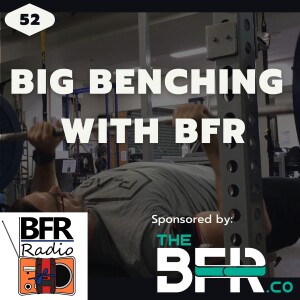
Wednesday Dec 07, 2022
Big Benching with BFR
Wednesday Dec 07, 2022
Wednesday Dec 07, 2022
Welcome to today's episode,
With most of BFR strength training focuses on low-load lifting (20-30% RM), where does this leave the addition of BFR strength training for strength/power athletes. Typically (non-BFR) loads of >60% of 1RM are required to improve strength and power. So today's article looks at the concept of high-load BFR strength training.
”Short Term Blood Flow Restriction, Increases Power Output, and Bar Velocity during the Bench Press”, and this was published in the Journal of Strength and Conditioning Research, and the primary author is Michael Wilks.
The podcast not only reviews the article, but I've also done a small study of my own. I add some of my own findings and thoughts on how you can use this in a training program.
This will be the last podcast for the year. Thanks for all of your support throughout the year. I appreciate you all.
If you are looking to get into blood flow restriction training please visit our website which is www.thebfr.co where there's lots of information, free resources and you can also purchase your own set of BFR cuffs.
You can also catch us on:
- Instagram - @thebfr.co
- Twitter - @thebfr_co
- YouTube - The BFR. co
If you do want to get into blood flow restriction, you can purchase your cuffs there as well. Thanks for listening. See you in the New Year and remember to keep the pump.
Chris

Thursday Aug 25, 2022
Extreme Injuries - BFR can bring back hope
Thursday Aug 25, 2022
Thursday Aug 25, 2022
Hi there,
Thanks for your patience in between episodes. If you've been following me on Instagram, you'll the scene that I've been overseas traveling in the UK and also in the us. And in particular, I. Coach track and field athlete and de athlete, Cedric Dubler who? Firstly, we went to the us and we competed at world champs where he finished eighth.
One of his best finishes as a senior in the decathlon. And then 10 days later we went and competed. The Commonwealth games in the UK. And he finished third there, which was an incredible effort considering it was only 10 days in between. So firstly, just to do one decathlon is pretty tough and to do two is pretty amazing.
Today's article review is perfect for to highlight how BFR can assist with anyone who has had quite an "extreme" injury and struggled to get back to some level of normal function. In particular such injuries typically result in significant loss of muscular strength and size. This articles reports on 7 different cases and highlights what kind of improvements can be achieved in a short period of time.
The article is:
Blood flow restriction rehabilitation for extremity weakness: a case series.
J Spec Oper Med, 15(1), 50-56. Hylden, C., Burns, T., Stinner, D., & Owens, J. (2015).
I hope you enjoy this episode.
If you are looking to get into blood flow restriction training please visit our website which is www.thebfr.co where there's lots of information, free resources and you can also purchase your own set of BFR cuffs.
You can also catch us on:
- Instagram - @thebfr.co
- Twitter - @thebfr_co
- YouTube - The BFR. co
If you do want to get into blood flow restriction, you can purchase your cuffs there as well. Thanks for listening. See you in a couple of weeks and remember to keep the pump.
Chris
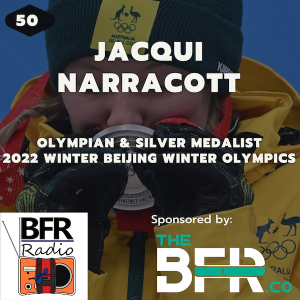
Tuesday Jul 05, 2022
Jacqui Narracott - Olympian, Medal Winning & Champion Skeleton Athlete
Tuesday Jul 05, 2022
Tuesday Jul 05, 2022
Welcome to Episode 50 of BFR Radio. And what a way to celebrate this milestone with Winter Olympian, Jacqui Narracott who won Silver at the recent Beijing Olympics for Skeleton.
I've been Jacqui's strength coach for over 7 years and it's been an honour to see her awesome achievements - especially in the last year. This is a great episode and we discuss quite a lot. In particular we focus on the period of time after her first Olympics and leading into her second and most recent Winter Olympics in Beijing. Aside from just BFR -related training we go through quite a bit. In particular:
- Reliving Beijing - enjoying the moment & having fun.
- Her team and how it worked with everyone living all around the world.
- How 2 months out from the Olympics, she injured herself and it nearly derailed her campaign.
- Dealing with COVID - lots of training, travel and competitions stories here.
This is a real behind the scenes podcast. So if you're a fan of Jacqui and want to hear some never before heard stories in the lead up to the Olympics this is a podcast not to miss. And yes, there are some new ways we used BFR as well so something for everyone.
I hope you enjoy this one.

